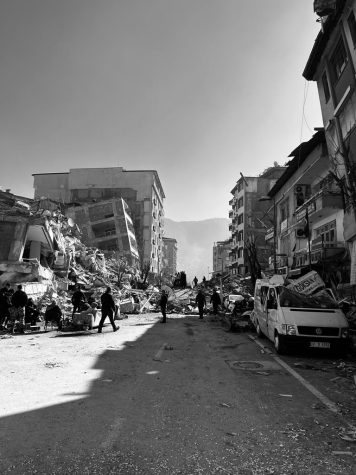Aytemiz: Two deadly earthquakes sent shockwaves through our community
February 15, 2023
Content warning: This article contains mentions of death.
A magnitude 7.8 earthquake struck Turkey and Syria at 4:17 a.m. on Feb. 6. Just nine hours later, another hit with magnitude 7.5. Turkey declared a level four alarm, which includes an international call for help. Turkish President Recep Tayyip Erdoğan called it the “biggest disaster in the last century,” yet, many in the United States seem to be indifferent to the situation.
For Turkish students, the news has seriously affected our daily schedules and abilities to focus on our studies. We are struggling to keep up with the fast-paced life in the U.S. while life is on pause back in our home country.

We have been raised in collectivist cultures, where a group is prioritized over an individual — where one’s pain is everyone’s pain. The fact that most of our family members and friends are safe and healthy doesn’t mean we’re not affected by the situation. Turkish people have been mourning since the news broke. Watching the death toll rise, we start and end our days in tears.
As of Wednesday, the death toll has risen to over 41,000, more than 35,000 in Turkey and 5,500 in Syria. Many have been rescued by search and rescue teams. Being rescued, however, doesn’t put an end to the victims’ pain.
In Turkey and Syria, as many as 5.3 million may be homeless as a result of the disaster. Survivors are left in freezing conditions under the rubble, with dead bodies and body bags everywhere. There is limited food and water, as well as a lack of warm clothes — all essential for them to stay alive.
Northwestern’s Turkish Student Association and many other TSAs around the U.S. immediately started fundraising the day after the earthquake. The fundraising attempts at NU included organizing a donut sale in front of the Technological Institute and The Rock, reaching out to the administration, collaborating with other student organizations, packaging physical donations at the Turkish Consulate General in Chicago and hanging posters around campus.
We managed to raise over $8,000 in four days with the help of the NU community. The donations are all sent to Ahbap, a Turkish organization that provides aid to those in need. A small proportion of future donations will be used to buy heated outdoor blankets, certain vitamins and other crucial items that are harder to find in Turkey.
Search and rescue teams have been pulling people out of rubble day in and day out, but these efforts are sure to lose steam. Considering the extent of the destruction, there will be a constant need for help in the foreseeable future.
As the TSA, we will continue fundraising for the next month, at the very least. We are currently collecting physical donations and organizing a panel in collaboration with the International Student Association. We are also trying to reach out to any Syrian students on campus to help them fundraise as well.
The awareness and support is much lower than it should be. An unfortunate interaction I had with one of my professors when I asked for an extension made clear how unaware of the situation some are. The professor simply told me that I could already submit a day late with a penalty and didn’t even ask if I was OK. Speaking for the other Turkish and Syrian students on campus — we are not OK. The invisibility of our mourning is commonplace. The lack of support has left us feeling like many faculty and teachers at NU do not know how extreme this situation is for all Turkish and Syrian community members on campus.
“I think some professors are trying to stick to class rules and not to favor students, which I understand and respect,” Turkish Weinberg sophomore Deniz Uzun said. “However, this is an extraordinary situation and showing some compassion is not favoring a student, it is just being human.”
“If I am sitting in a library trying to finish some homework for a class, I feel as though I am betraying my people. This is an indescribable feeling of guilt and helplessness.” Uzun said. A Turkish Weinberg freshman, Duru Genç, said “the idea of prioritizing academics over aid for our country at such a heartbreaking time seemed morally wrong.”
As part of the Turkish community on campus, we will continue our fundraising efforts in every way we can, and we’re inviting everyone to take action. In the words of NU Turkish Prof. Oya Topçuoğlu, “rebuilding what has been lost will take years.”
Yağmur Aytemiz is a McCormick sophomore. She can be contacted at [email protected]. If you would like to respond publicly to this op-ed, send a Letter to the Editor to [email protected]. The views expressed in this piece do not necessarily reflect the views of all staff members of The Daily Northwestern.

